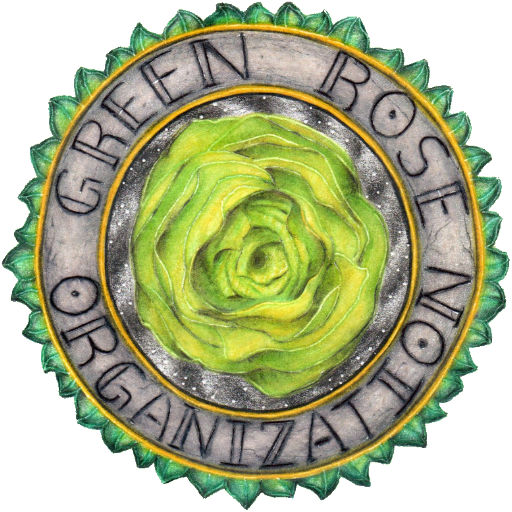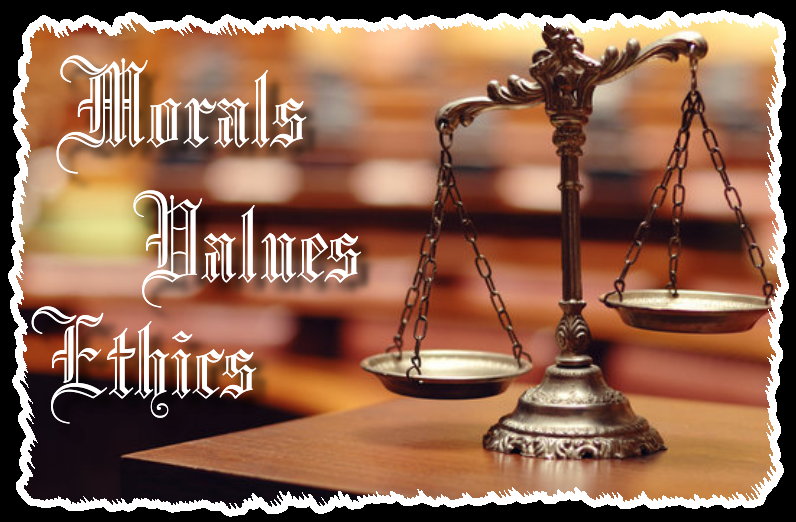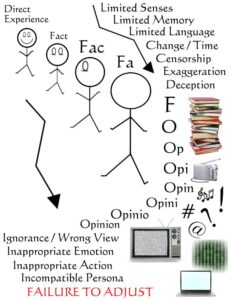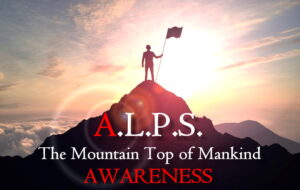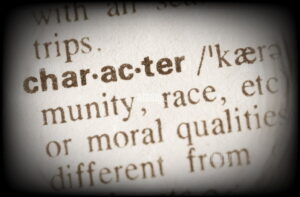COMPARING MORALS, VALUES AND ETHICS
by Shawn Malzahn
It can be confusing when we try to think about the subtle differences between morals, values and ethical codes of conduct. It can be just as confusing as to why these concepts are so important to begin with, and how they are actually shaping our experiences of reality day by day, second by second, whether we realize it or not. It is important to be able to distinguish between the three terms, because it gives our attention 1) more options for self-observation, and 2) It helps us find something specific and “concrete” to focus on deep within ourselves, that if changed, or modified in any way, will lead to a chain reaction of psycho-somatic (mental & physical) events causing our entire perception of reality to change, which includes how we feel emotionally on a day to day basis. This is probably one of the most important reasons for wanting to know the differences between morals, values and ethics, because it has a direct effect on the way that we feel inside, and surely we all want to feel good to the best of our ability, do we not? Thus from here on out we will be discussing a few things, and that is, what specifically are the differences between values, morals and ethical systems, why are they so important, and how we can begin using them to our advantage in life in order to help ourselves and others.
I believe it would be easier for us if we were to start our discussion with values. The word value can be used in two distinct ways, and thus can carry with it different connotations, or meanings, depending on the context in which it is used in. For example, value, used as a verb, is to consider something to be of great importance, or benefit. When used as a noun, value describes a person’s principles or standards of behavior. Keep in mind that just because someone professes to have values that they stand for, this does not necessarily mean that they are good values, or moral principles per se, but rather could in actuality be vicious sins (or behaviors that lead one astray from that which is conducive to inner and outer harmony and growth) obviously bringing about more harm than help to oneself and others due to the selfish focus these types of so called values require for their perpetuation. Either way, a value is a value, it is simply something that we place importance on, and as such, something that we generally give priority to, whether that something be good or bad, it does not matter. The point I’m trying to make here is that we need to be mindful of what we consider valuable in life. A lot of us think things like cars, money, boats, jewelry, fancy clothes, fine food, and exotic vacations are all things to be valued and coveted in life, but in reality, it is these things that cause us the most harm when we start to place more value on them at the expense of neglecting our internal, intangible assets, such as love, kindness, respect, forgiveness, charity, etc. you know, those moral principles we have been talking about. You see if it wasn’t for these intangible noble characteristics of man, he or she would never be able to manifest any of those outer luxuries, let alone sustain them for any prolonged period of time. For example, it takes responsibility to get up and go to work in order to acquire the means necessary to even have those types of things. Just as honesty, respect and forgiveness will also be indispensable when it comes to fulfilling your duties in the workforce, which in turn would further secure your future employment, which will obviously benefits your family, who will, as a result, be better equipped to benefit society on some significant level later on in life. You get where this is going? We need to value our moral principles more so than anything else, and these principles should be based on ideas of how we can better harmonize and grow within not only ourselves (by way of harmonizing the mind with a clean conscience through righteous living) but also by harmonizing with others, which will then allow us to work together in order to better harmonize with our environments as well, because everything is interdependently related and affected by everything else that there is in existence, think about the butterfly effect on a cosmic scale. That’s how much power we have to influence our realities. Therefore it is absolutely imperative that we learn to cultivate the virtues, or moral principles, by finding more and more ways to live our lives according to their definitions, and upon doing so, we will find ourselves having very little worries in life, that is a guarantee.
So then what shall we consider a moral principle to be if it is so important that we be living our lives according to their definitions? Moral is a word that we often hear when someone says things like, “and the moral of the story is?” essentially asking, “What lesson is there to be learned here?” So in a way, we can see that morals are basically lessons to be learned. Lessons on how to conduct one’s own thoughts, words, and deeds in a specific manner that will lead to as much health, healing, and harmonization as possible, both within oneself, as well as without oneself, also with others, and even with his or her environment, so on and so forth, impacting as many and as much as possible in a positive way. These moral principles, or virtues, are much more than just beliefs about right and wrong behavior acceptable to human beings, living in civilizations, at specific periods of time in space, they also correspond to sensations that can actually be felt in the body. For instance, I know that when I feel courageous, I feel differently than I do when I feel say, responsible, or even that of honest or forgiving for that matter. Just think about that for a second. Visualize how you feel when you truly did something courageous in life, imagine that feeling you experienced in your mind and body compared to a time when you were feeling like a real honest person, try and see if there is a difference in how those two mental pictures make you feel on a physical level. I’m willing to bet there are differences between the two, right? So if that be true, then it should only make sense that we try our hardest to seek out and identify as many potential moral principles as possible, and to then try and translate them into our day-to-day actions of though, speech, and deed, because these virtues (when acted upon) correspond to ACTUAL, REAL, POSITIVE, emotional sensations, which will no doubt bring about greater and greater degrees of health, peace and prosperity within and without ourselves, as well as with whatever and whoever we may be involved with.
A great way to begin practicing morality is by adopting and memorizing certain ethical systems and/or codes of conduct to live by. These ethical systems, once fully integrated into our character, are essentially blueprints that our subconscious mind uses to construct our perception of reality from a point of experience onward, to the way that we feel emotionally in response to contact with the various elements and events within the range of our immediate experience, to finally the behaviors and mannerisms of speech and body we feel compelled to carry out according to our initial gut-feelings, and this brings us to the point of action, and actions have reactions, so we better make sure that we are always operating from a good ethical foundation! So then what really is an ethic, or ethical system anyway? and how is it different from a moral, or virtue? Well essentially ethical systems are really just bundles of moral principles meant specifically to assist us with whatever societal operation we are involved with calls for. For example, in the field of banking, trust and honesty are considered part of a good work ethic due to the nature of ones required occupational duties, whereas the same two virtues might not work so well in the operation of say, interrogation, or detective work, because a certain element of doubt and deception may be necessary in order to get to the Truth of the matter at hand. So it is important to make sure that we are adopting the best possible ethical codes of conduct for each arena that we may find ourselves operating in within our social structures, such as, work, home, extended family, friends, neighbors, communities, states, countries, planets, etc. to ensure the greatest amount of harmonization and growth as possible, for not only oneself, but for all those who may be involved and affected. Think about that for a second, if we have adopted a work ethic best suited for say, a corporate sales position, we likely (and unfortunately) begin to place value and importance on things like money, competition, hierarchy advancement, power, influence, etc. because this is what leads to adaptability and success in that type of social arena. However, consider if we allow this ethical system to continue operating and influencing us in other social settings, like say our household for example. Being too focused on money, competing with siblings or trying to establish dominance in the family hierarchy will only cause conflict. Instead, we might want to adopt a different ethical system especially designed to harmonize with (and grow) the household, a system that places value and importance on virtues such as modesty, simplicity, love, humility, respect, forgiveness, etc. You see, the great thing about these virtues, or moral principles, is that they are universally compatible across all social arenas (and they’re timeless too), as opposed to non-virtues, or vices, that may advance us or others only temporarily in just one or two social arenas at any one time, often at the expense of long-term negative consequences.
Hence if all this be true, then where can we start in our efforts to begin aligning ourselves with such universal and timeless harmonious behavior, that is to say, moral principles, or virtues (whatever we wish to call it)? To that, I say we should appeal to the dictates of our own conscience, and not that by which is prescribed by the mere opinions of others, or laid out in a book for us to read and accept blindly based on the supposed authority of some grand system or manmade institution. For the most part, our conscience will let us intuitively distinguish the difference between right and wrong behavior when sincerely pondering any course of action with noble intent. Failure to do anything less than the dictates of conscience may result in being fated to experience less than desirable consequences in the immediate, near or long-term future, for we already know, actions have reactions, and every cause has an effect, therefore absolutely everything in the created cosmos must be connected in some type of way. And if that is the case, then that means that our very physical wellbeing, our emotional states, even the condition of our mind, and the nature of our behaviors, are all really impacted, interfered with, or “affect” in some type of way based on the ethical systems and codes of conduct we adopt and internalize into our characters. Thus we should only, and always, forever strive to seek the guidance and wise counsel of our higher conscience when posed with any and all situations in life, and again, the best way to do this is to consider every thought we have in response to any and all experiences in life. We need to ask ourselves, “how does having this thought make me feel, and how does that sustained feeling motivate me to speak and act towards myself, others and my environment? And above all, are those actions leading to greater degrees of harmonization and growth for as many and as much as possible?
In conclusion, a value is simply something that we place value on and give priority to. Values can be either good or bad depending on what they are. Ideally, we should only value things that lead to greater degrees of harmonization and growth. Morals, also called virtues, are simply beliefs on how one should conduct his or her own thoughts, words, and deeds in a specific manner that will lead to as much health, healing, and harmonization as possible, both within oneself, as well as without oneself, also with others, and even with his or her environment, so on and so forth, impacting as many, and as much as possible in a positive way. And finally, an ethic is a system of moral principles that we adopt when operating in certain societal spheres, such as; work, home, community, etc. All in all, the best way to align oneself with moral principles is to listen to the subtle whisper of one’s own conscience, and to consider how every thought, word, and deed is impacting your life, and the lives of those around you.
